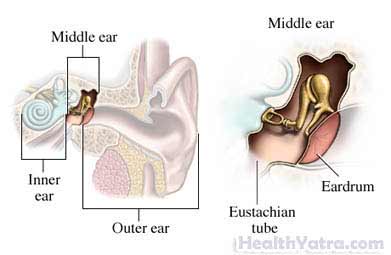Definition
Tympanoplasty is a surgery done to repair the eardrum and middle ear bones. The eardrum and bones are necessary to hear.

Types of tympanoplasty include:
- Myringoplasty—repair of a tear in the eardrum
- Tympanoplasty with ossiculoplasty—repair of a tear in the eardrum and correction of a defect in the bones of the middle ear
- Tympanoplasty with mastoidectomy—repair of a tear in the eardrum and eradication of bony infection in the area behind the ear
Reasons for Procedure
The procedure can also help to:
- Restore hearing and treat certain types of deafness
- Prevent infection of the middle ear
Possible Complications
Complications are rare, but no procedure is completely free of risk. If you are planning to have a tympanoplasty, your doctor will review a list of possible complications, which may include:
- Infection
- Failure to restore hearing
- Damage to structures in or near the middle ear:
- Nerves—resulting in loss or distortion of taste, paralysis of the face
- Middle ear bones—resulting in loss of hearing that may be permanent or require further surgery
- Inner ear structures—resulting in dizziness
What to Expect
Prior to Procedure
Before surgery, your doctor will check to be sure that you do not have an ear infection.
You will have several tests, including an ear exam and a hearing test. In certain cases, a CT scan is also done.
Talk to your doctor about your medicines. You may be asked to stop taking some medicines up to one week before the procedure, like:
- Aspirin or other anti-inflammatory drugs
- Blood thinners, such as clopidogrel (Plavix) or warfarin (Coumadin)
Anesthesia
The procedure often only requires local anesthesia. Your ear and the area around it will be numb.
Description of the Procedure
A small incision will be made behind the ear. Some tissue will be extracted from this area. This tissue will then be attached to the eardrum to cover the hole. Other materials may be added to hold the graft in place. If the bones of the middle ear need to be repaired, this is done as well.
A small pack may be left in position in the ear canal. The incision behind the ear will be closed with stitches.
How Long Will It Take?
1-2 hours
Will It Hurt?
Anesthesia prevents pain during the procedure.
Post-procedure Care
To insure proper healing, avoid the following:
- Blowing your nose hard
- Sneezing
- Exposing your ear to water—Ask your doctor how to wash your hair and shower for the first few weeks after surgery.
- Flying
- Swimming or diving
- Heavy weight lifting and straining
It will take several weeks after surgery to determine if the tympanoplasty was a success. Complete recovery takes about four weeks. Be sure to follow your doctor’s instructions .
Call Your Doctor
After arriving home, contact your doctor if any of the following occurs:
- Signs of infection, including fever and chills
- Increasing fluid or foul-smelling fluid draining from the ear
- Redness, swelling, increased pain, bleeding, or discharge from the incision site
- Dizziness
- Pain that you cannot control with the medicines you have been given
- Cough, shortness of breath, or chest pain
- Any new symptoms
In case of an emergency, call for medical help right away.
